Image: from left: Charlotte Streck, Tom Clements, Chris Dragisic, Roselyn Fosuah Adjei, Marleine Saira Flora, Peter Graham, Tim Clairs
14 November, 2022, Sharm El Sheikh, Egypt
The launch of the Forest and Climate Leaders’ Partnership during the World Leaders’ Summit (WLS) on 7 November at the UNFCCC COP 27 in Egypt set the tone for high ambition and action on forests throughout the rest of the conference and for promises beyond COP. Following the launch, the FCLP held its first ministerial meeting on 12 November; led by Ghana’s Honorable Minister for Lands and Natural Resources, Samuel Jinapor and US Special Presidential Envoy for Climate, John Kerry; with leaders from the 28 member countries, including the EU. Members discussed the partnership’s priorities to mobilize and scale up action on forests and its governance structure and timeline.
Days after the first FCLP ministerial meeting, key architects of the FCLP who played a critical role in the success of the first meeting shared their fresh insights at the UNDP pavilion on 14 November. This conversation provided a unique opportunity to hear directly from the two sherpas to the co-chairs of the FCLP, Roselyn Fosuah Adjei (Director for Climate Change and REDD+ Coordinator at Ghana’s Forestry Commission) and Chris Dragisic (Branch Chief, Partnerships & Initiatives at US State Department), as well as Tom Clements (Strategic Policy Advisor to the Secretary of State, UK DEFRA) and Marleine Saira Flora (Community Action by Congo Indigenous Women). Roselyn and Chris played critical roles in facilitating their governments’ engagement in the FCLP and supporting the leadership of Ghana and the US. Tom was instrumental in mobilizing the FCLP after the signing of the 2021 Glasgow Declaration on Forests and Land Use (GLD) while Marleine was the Indigenous Youth representative who addressed leaders during the WLS and shared her essential perspective on the implications for Indigenous peoples and the need to partner with them. The discussion was facilitated by Charlotte Streck of Climate Focus, lead organization of the Forest Declaration Assessment.
“The will that I heard on Saturday and the excitement and desire to work together was inspiring.”
Chris Dragisic
Below are the key takeaways and exclusive insights from these architects:
Who? At COP26 in Glasgow, more than 140 Heads of State from countries with over 90% of the world’s forests committed to the Glasgow Leaders’ Declaration on Forests and Land Use (GLD), promising to work together to halt and reverse forest loss and land degradation by 2030 while delivering sustainable development and promoting an inclusive rural transformation. The Forest and Climate Leaders’ Partnership, a mechanism to deliver these commitments, includes 28 member countries with Ministerial-level representation who commit to create collective consensus on how to drive progress towards the 2030 target and provide leadership in at least one of the priority action areas. Regarding other non-governmental stakeholders, Chris outlined three potential opportunities for engagement: 1) through an advisory committee made up of non-government partners; 2) partners of the initiatives and action areas whose experiences provide essential contributions; and 3) through the yearly high-level political moments to share other perspectives and key voices.
What? The Forests & Climate Leaders’ Partnership (FCLP), initially announced at New York Climate Week in September 2022 and officially launched at COP27 during the World Leaders’ Summit on November 7th, was created to enhance cooperation on delivering the 2030 forest commitments to scale ambition and find innovative solutions to ongoing problems. Roselyn summarized well the significance of this partnership:
“So many years have passed without having any substantial pathway in how we bring forest countries together, FCLP is providing a platform for support to already ongoing action in countries towards achieving Glasgow goals.”
Roselyn Fosuah Adjei
The six FCLP’s action areas include: (1) sustainable land use economy and supply chains; (2) mobilising public and donor finance to support implementation; (3) shifting the private finance system; (4) supporting initiatives led by Indigenous Peoples’ and local communities; (5) strengthening and scaling carbon markets for forests; and (6) building international partnerships and incentives to preserve high-integrity forests.
How? The FCLP will operate with rotating co-chairs and regular consultations and avenues for non-state actors like private sector and Indigenous peoples to engage. The first co-chairs are the USA & Ghana. Countries that join are committing to lead by example in the implementation of their national goals and striving to be more ambitious over time. They also commit to work together to advance global forests and climate efforts, and to meet annually to take stock of progress. Tom laid out the three essential elements of this partnership: accountability and transparency by taking stock of progress, scaling up action by addressing challenges through partnership, and maintaining political momentum through yearly high-level events at each climate COP until 2030. Further, Marleine reminded partners about the importance of action and transparency in a landscape with “too many speeches” and the essential role of women as key partners:
“We want to implement a mechanism and framework where land and forest legislation are linked to the way of life of local peoples. Where there is value in the traditional knowledge of Indigenous peoples and respect for free and informed consent in accordance to the UN Declaration on the Rights of Indigenous people...There is a misunderstanding that Indigenous peoples cannot managed our funds or are not organized — we are quite well organized. What we want is transparency. We no longer want speeches or things that are not clear... We want public hearings with women and young people being heard. Most of the time, women are set aside and told we are not entitled to speak — this is no longer how we want to exist.”
Marleine Saira Flora
In Chris’s response to this issue of accountability and transparency, which also came from the audience, she notes:
“There is a reason we put this in a high-level setting. There is a reason there is reporting on the pledges made...There is a reason we have a website where we’ll be talking about what we do. So that people can see what we do. Not only we as members can say to each other – ‘hey you need to step it up’ but so other stakeholders know what’s being done and can ask questions. Pure transparency is the best tool we have... You can expect a real focus on when we set out to do something we are following through and letting people know what we’ve achieved and where we’re falling short. “
Chris Dragisic
What’s Next / When?
The timeline and process are still being confirmed but the details below outline the next steps for the FCLP.
“we need a process that is efficient and also serves the interest of driving forward action”
Chris Dragisic
“We do not want to arrive at 2029 and realize that all the countries have not met their targets and we have just one year. So, really having the FCLP providing that support...putting in place that structure to curb, as much as possible, disappointment in 2030. A platform for partnership, support, collaboration.”
Roselyn Fosuah Adjei
To wrap up the session, Tim Clairs, head of UNDP’s Climate and Forests team, provided closing remarks, thanking the panelists for making the time to share their insights at the UNDP Pavilion. He reconfirmed UNDP's support to the FCLP, noting the agreement with the Government of Germany to provide initial funding for the interim secretariat.
Watch the full recording of the session here: COP27: Walking the Talk on Forest & Climate Commitments - YouTube
ENGLISH
On Thursday, Oct. 27, a virtual training titled “Engaging in COP27: A Training for Indigenous Peoples” was hosted by the Forest Declaration Platform, UNDP, Tribal Link Foundation, International Indigenous Peoples Forum on Climate Change, and International Indian Treaty Council.
The training covered topics ranging from the history of Indigenous Peoples’ engagement in the UNFCCC to opportunities in this year’s COP27 in Sharm el-Sheikh, plus an additional overview of Nationally Determined Contributions (NDCs) and UNDP’s Climate Promise, including social inclusion elements and examples of work with IPs on NDCs in Latin America and the Caribbean.
Recordings from the event can be found on YouTube and are available in English, Spanish, French, and Portuguese
Download the full presentation here.
ESPAÑOL
El jueves 27 de octubre, la Plataforma de la Declaración de los Bosques, el PNUD, la Fundación Tribal Link, el Foro Internacional de los Pueblos Indígenas sobre el Cambio Climático y el Consejo Internacional de Tratados Indios organizaron una formación virtual titulada "Participación en la COP27: una formación para los pueblos indígenas".
La formación abarcó temas que van desde la historia de la participación de los Pueblos Indígenas en la CMNUCC hasta las oportunidades en la COP27 de este año en Sharm el-Sheikh, además de una visión general adicional de las Contribuciones Determinadas a Nivel Nacional (NDCs) y la Promesa Climática del PNUD, incluyendo elementos de inclusión social y ejemplos de trabajo con los PI en las NDCs en América Latina y el Caribe.
Las grabaciones del evento se pueden encontrar en YouTube y están disponibles en inglés, español, francés y portugués
Descargue la presentación completa aquí.
FRANÇAIS
Le jeudi 27 octobre, une formation virtuelle intitulée "Engaging in COP27 : A Training for Indigenous Peoples" a été organisée par la Forest Declaration Platform, le PNUD, la Tribal Link Foundation, l'International Indigenous Peoples Forum on Climate Change et l'International Indian Treaty Council.
La formation a couvert des sujets allant de l'histoire de l'engagement des peuples autochtones dans la CCNUCC aux opportunités de la COP27 de cette année à Sharm el-Sheikh, ainsi qu'un aperçu supplémentaire des contributions déterminées au niveau national (CDN) et de la promesse climatique du PNUD, y compris les éléments d'inclusion sociale et des exemples de travail avec les PA sur les CDN en Amérique latine et dans les Caraïbes.
Les enregistrements de l'événement se trouvent sur YouTube et sont disponibles en anglais, espagnol, français et portugais.
Téléchargez la présentation complète ici.
PORTUGUÊS
Na quinta-feira, 27 de outubro, um treinamento virtual intitulado "Envolvendo-se na COP27: Um Treinamento para os Povos Indígenas" foi realizado pela Plataforma de Declaração Florestal, PNUD, Fundação Tribal Link, Fórum Internacional dos Povos Indígenas sobre Mudança Climática e Conselho Internacional do Tratado Indígena.
O treinamento cobriu tópicos que vão desde a história do engajamento dos Povos Indígenas na UNFCCC até oportunidades na COP27 deste ano em Sharm el-Sheikh, mais uma visão geral adicional das Contribuições Determinadas nacionalmente (CNDs) e a Promessa Climática do PNUD, incluindo elementos de inclusão social e exemplos de trabalho com os CNDs na América Latina e no Caribe.
As gravações do evento podem ser encontradas no YouTube e estão disponíveis em inglês, espanhol, francês e português.
Baixe a apresentação completa aqui.
On Monday, 19 September 2022, at New York Climate Week and on the margins of the 77th UN General Assembly, the Forest Declaration Platform and Forest Declaration Assessment presented a preview of the annual Global Progress Assessment toward 2030 forest targets.
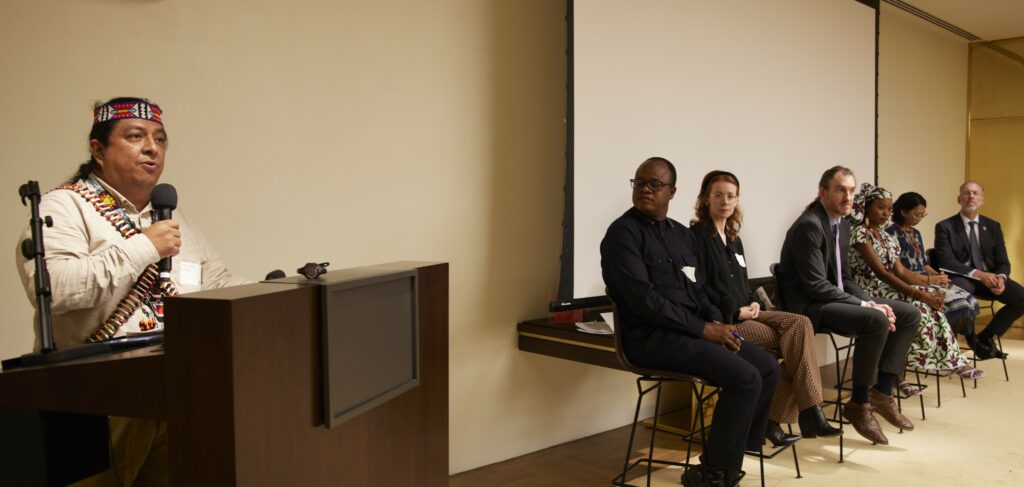
Ricardo Tsakimp, Uwishin (shaman) of the Shuar peoples from the Ecuadorian Amazon opened the event with a blessing to set the tone for the event and the week ahead, sharing an important message about the state of the planet and the urgency to stop its destruction. Erin Matson, Senior Consultant at Climate Focus, followed with a keynote presentation of the Forest Declaration Assessment findings. The report this year is structured around four main themes: (1) Overarching forest goals like halting deforestation and increasing restoration; (2) sustainable production and development; (3) forest finance; and (4) governance. The Assessment report covers the challenges towards progress on each of these themes and examples of progress in different countries and regions. The findings show some bright spots for global progress toward the 2030 forest goals, though overall, progress is not (yet) on track to meet the 2030 forest commitments. The 2022 Forest Declaration Assessment will be launched on October 24 and available at forestdeclaration.org. Please sign up for the newsletter or follow @Forest_Assess to receive update and stay informed about the report launch.
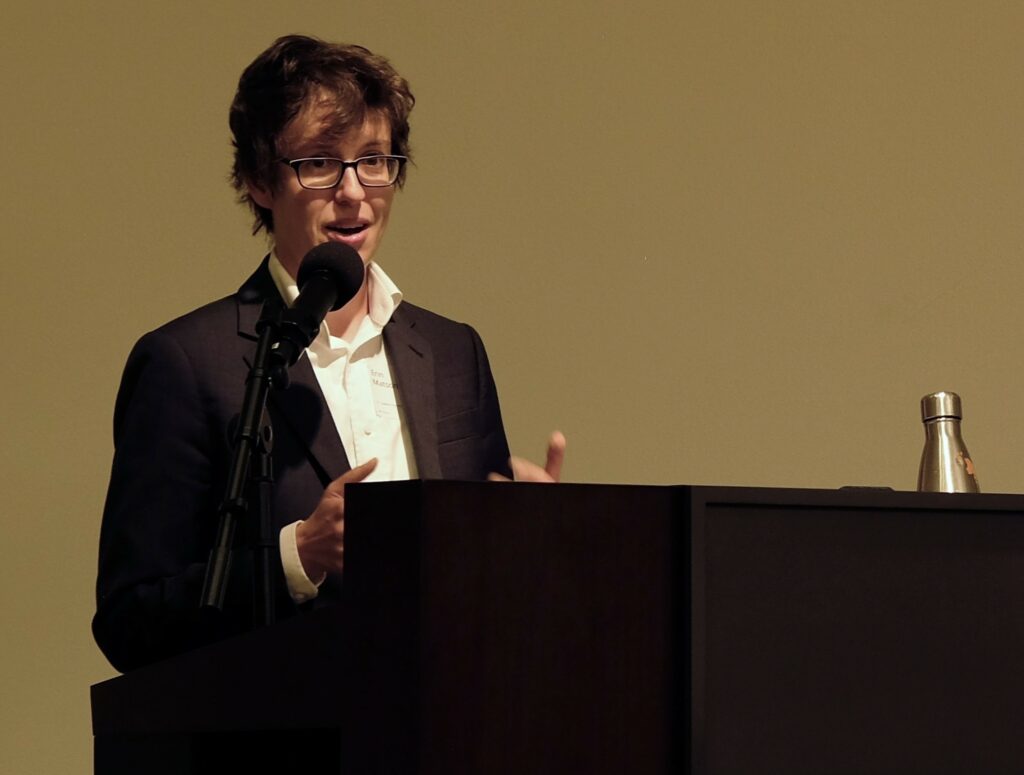

Afterward, an expert panel of Indigenous Peoples, civil society, philanthropy, and local political leaderships shared progress towards forest commitments, described lessons learned, and urged the audience to accelerate action toward ending deforestation and forest degradation.
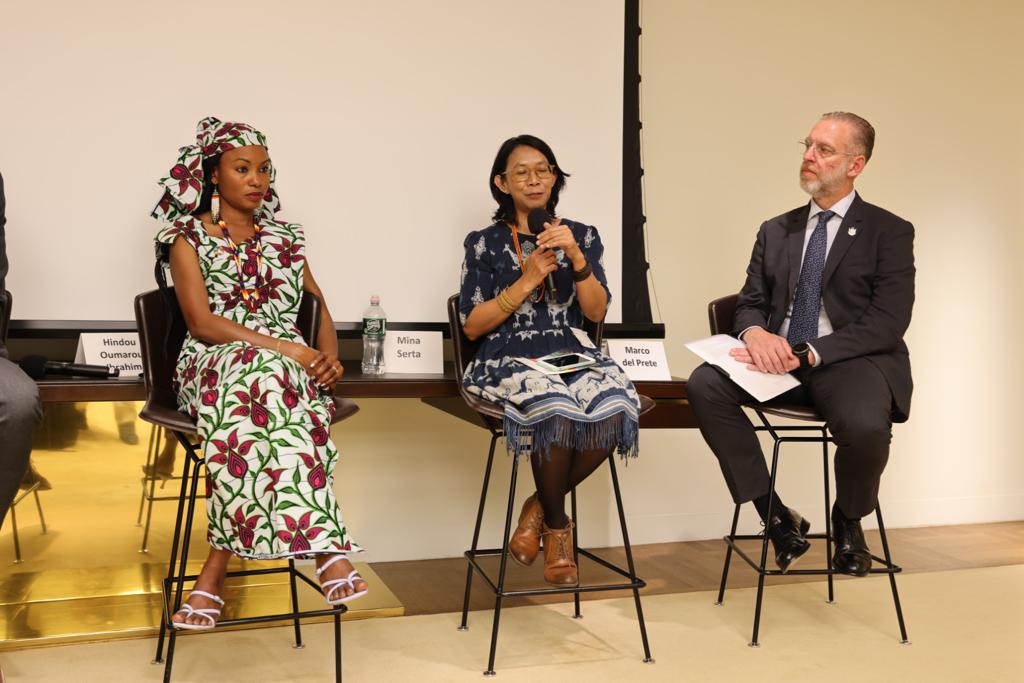
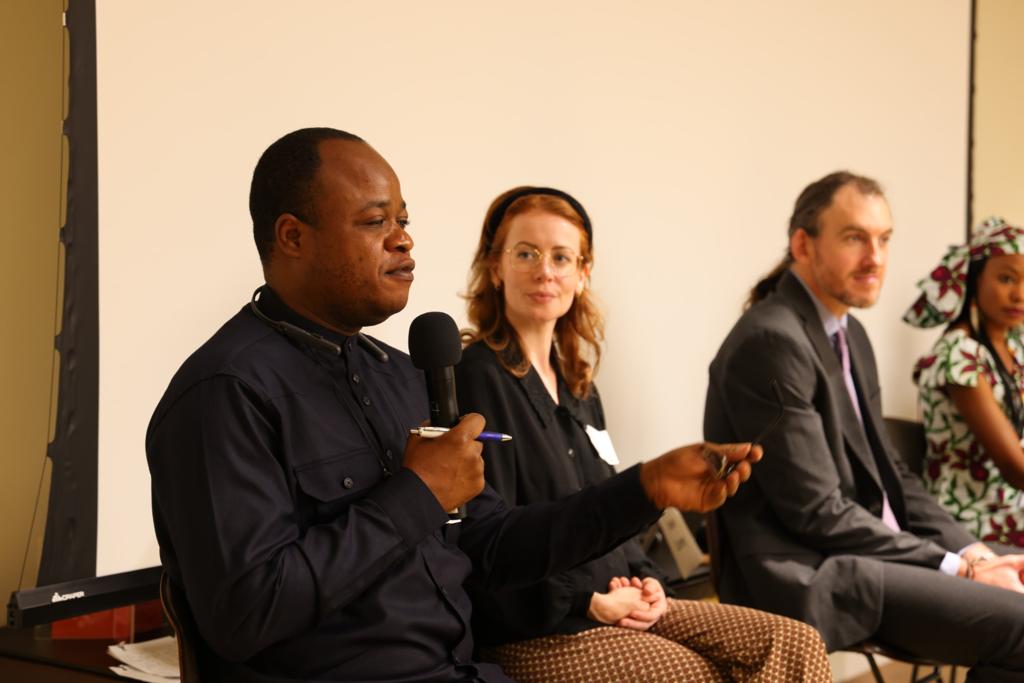
The Forest Declaration Platform partners thank all guests, participants, and speakers for their engagement and commitment to more holistic, honest dialogue and between government, civil society, and Indigenous Peoples.
Please find a video recording of the event here. You can read the 2022 Assessment report when it launches on October 24, 2022 at forestdeclaration.org. Sign up for the Forest Declaration Newsletter here to stay informed about key messages and events on the Forest Declaration Assessment.
By Nina Kantcheva - Senior Policy Advisor, Indigenous Peoples and Local Community Engagement
As custodians of natural resources and archivists of scientific and traditional knowledge, Indigenous women play an essential role in preserving forests and natural ecosystems. Indigenous women are indispensable to achieving climate justice, taking the lead to defend Indigenous Peoples’ lands and territories and advocating for Indigenous peoples’ collective rights worldwide.
Following this year’s International Day of World’s Indigenous Peoples’ central theme, “The role of indigenous women in the preservation and transmission of traditional knowledge", we bring you five Indigenous women climate activists you should know about:

1. Lola Cabnal, Maya Q'eqchí, Guatemala
Lola Cabnal is a Mayan Q'eqchí woman from a rural community in the municipality of Livingston, Guatemala. She is the Chair of the Council of Indigenous Women and Biodiversity, and a climate advocacy strategist for Ak' Tenamit Association. Lola is also among the Indigenous Peoples’ and civil society representatives to the UN-REDD Programme’s Executive Board, where she has given voice to the perspective of Indigenous women and communities, reinforcing UN-REDD's inclusive, gender-responsive, rights-based approach.
Indigenous Peoples and other forest-dependent communities are often disproportionately impacted by climate injustices and are often left out of the political decision-making process, even though they are rights and knowledge holders. Lola’s work in political advocacy for the Q'eqchí peoples carries extreme significance, for young Indigenous women in particular. By educating others on the rights and knowledge of her own community, Lola has been paving the way for young Indigenous climate activists to advocate for the respect and recognition they deserve.

2. Veronica Inmunda, Kichwa, Ecuador
Veronica Inmunda, a Kichwa woman from the Ecuadoran Amazon, is the Youth, Culture and Sports Coordinator at CONFENIAE (Confederación de Nacionalidades Indígenas de la Amazonía Ecuatoriana). She is a law student focusing on the protection of Indigenous Peoples’ rights and is a passionate advocate for the creation of a new model to integrate Indigenous knowledge and practices into the next generation’s educational awareness.
Veronica is one of the leaders of the Sacred Headwaters Initiative, which is building a shared vision among Indigenous Peoples, NGOs, the philanthropic community, social entrepreneurs, and governments towards establishing a protected region across Peru and Ecuador that is off-limits to industrial-scale resource extraction and is governed in accordance with traditional Indigenous principles of cooperation and harmony that foster a mutually enhancing human-nature relationship. The Initiative is led by Amazonian Indigenous federations CONFENIAE (Ecuador), AIDESEP (Peru), ORPIO, and COICA, in partnership with Pachamama Alliance, and Fundación Pachamama.
Of the initiative Veronica says: “For us, the Sacred Headwaters is a symbol of peace, a symbol of harmony, a symbol of unity, and above all, it is a symbol that we want our rainforest to remain intact in a hundred years and beyond.”
Listen to her powerful message recorded for an event at COP25 organized by SHE Changes Climate: Verónica Inmunda's Letter to world leaders & people who are financing the destruction of the planet:https://www.youtube.com/watch?v=Czs23BE7Vcw

3. Rukka Sombolinggi, Toraja, Sulawesi, Indonesia
Rukka, a Torajan woman from the highlands of Sulawesi, is the first female Secretary General of the Indigenous Peoples Alliance of the Archipelago (AMAN), the world’s largest national-level Indigenous Peoples organization. She is also the new co-President of the Global Alliance for Territorial Communities, a worldwide network that unites some of the largest Indigenous networks working to protect forests and promote solutions to climate change stemming from Indigenous traditional knowledge. Coming from a family of Indigenous Rights’ defenders, Rukka and her family have been rigorously advocating for Indonesian Indigenous rights for the past thirty years.
Rukka joined UNDP Regional Indigenous Peoples Programme at UNDP Asia Pacific Reginal Centre in Bangkok, Thailand as Program Specialist in 2007 and returned to AMAN in early 2011 as Project Manager. Throughout her career, she has been the voice of Indigenous communities across Malaysia, Philippines, Indonesia and Timor Leste, becoming an influential voice among Indigenous women not only in Southeast Asia but globally as well.

4. Hindou Oumarou Ibrahim, Mbororo, Chad
Hindou, a Mbororo Indigenous pastoralist woman, is the founder of the Association of Indigenous Peul Women and Peoples of Chad (AFPAT), a community-based organization focused on promoting the rights of girls and women in the Mbororo community and inspiring leadership and advocacy in environmental protection. She is an influential climate leader in Africa, advocating for the importance of traditional knowledge for building resilience of Indigenous and forest communities to cope with the climate crisis. In 2016, Hindou was selected to represent civil society at the signing of the historic Paris Agreement. She holds several leadership positions and actively promotes the value of Indigenous knowledge in mitigating the effects of climate change. She is Co-chair of the Facilitative Working Group of the Local Communities and Indigenous Peoples Platform for the UN Convention on Climate Change, as well as a member of the United Nations Permanent Forum on Indigenous Issues, and a member of the Executive Committee for the Indigenous Peoples of Africa Coordinating Committee (IPACC).
Earlier this year, in an event on carbon finance for the forest sector organized by the Forest Declaration Platform on the occasion of the 21st session of the UN Permanent Forum on Indigenous Issues, Hindou said, “as Indigenous peoples we know how to protect our forests. We know how to manage funding. You just have to respect the way we do it. We want to be partners, not recipients or beneficiaries.” Hindou continues to advocate for the critical importance of shifting climate finance directly to Indigenous communities.

5. Grace Balawag, Kankaney-Igorot, The Phillipines
Grace, a Kankaney-Igorot Indigenous woman from the Philippines, is the deputy coordinator for Climate Change Adaptation and Mitigation Program of the Tebtebba-Indigenous Peoples’ International Centre for Policy Research and Education. She also coordinates the Indigenous Peoples’ Partnership on Climate Change, Forests and Sustainable Development, called the Elatia Partnership, with nineteen country Indigenous Peoples Organizations in fourteen countries in Asia, Africa, and Latin America.
Grace joined policy advocacy work for Indigenous Peoples under Tebtebba at the global and regional levels, in relation to climate change, biodiversity, sustainable development, and human rights, especially Indigenous Peoples’ rights. She has also served as an Indigenous People’s representative to the UN-REDD Programme Policy Board, and currently a member of the Facilitative Working Group of the Local Communities and Indigenous Peoples Platform (FWG-LCIPP) under the UN Framework Convention on Climate Change (UNFCCC).
The achievement of the Paris Agreement goals will rely on a combination of financial and policy mechanisms and action from both public and private actors and all sectors of the economy to urgently reduce global emissions. Carbon markets can play a key role in the transition process, incentivizing the development of low-carbon initiatives and forest conservation, by creating an economic incentive for reducing emissions as cost-effectively as possible. This role is recognized and facilitated through Article 6 of the Paris Agreement and the associated Paris Rulebook, adopted in Glasgow at COP26.
The role of carbon markets in climate finance is growing as transactions continue to increase, particularly in the Voluntary Carbon Markets (VCM). According to Forest Trends, as of 2016, offsets equivalent to 1.1 billion metric tonnes of carbon dioxide emissions (BtCO2e) have been transacted voluntarily. Accelerating ambition and implementation of climate action in forests, as part of countries’ goals in their Nationally Determined Contributions (NDCs) is necessary to reach net-zero emissions. Carbon markets may serve as one mechanism to drive the investment needed at the regional, national, and local levels to achieve these goals. If designed and implemented well, carbon markets represent a potential opportunity to access critically needed finance to support forest conservation and restoration efforts. However, integrity in carbon markets is essential to ensure that the use of carbon credits strengthens – rather than undermines – global action towards achieving the goals of the Paris Agreement.
High-integrity in carbon markets must ensure the application of robust environmental and social safeguards and respect the rights of Indigenous peoples and local communities. Indigenous Peoples and local communities (IPLCs) are recognized as the most effective forest stewards and, therefore, should have access to more finance for their continued efforts to protect and restore forests. They have expressed a need for further capacity building on carbon markets to facilitate their informed engagement to participate in standard-setting; access finance, and exercise their rights.
If Indigenous Peoples, countries, and other stakeholders accessing carbon markets are going to be able to meet demand from private sector buyers, market-based standards, NGOs, and local stakeholders alike for higher quality units with demonstrated additional sustainable development impacts, there needs to be a greater upfront investment in capacities to build robust and integrated systems to be able to effectively implement in line with expectations. This includes establishing participatory processes, ensuring appropriate community engagement from design to implementation; ensuring consistency with the rights and interests of affected Indigenous peoples and local communities; and developing processes for ensuring just and equitable benefit sharing arrangements for Indigenous and local communities.
This webinar, hosted by the Forest Declaration Platform and the UN-REDD Programme, aimed to provide the space for capacity building on these topics, by convening Indigenous peoples and local communities with technical experts from partners of the Forest Declaration Platform during the UN Permanent Forum on Indigenous Issues.
Frances Seymour, Distinguished Senior Fellow at World Resources Institute (WRI), and Jennifer (Jing) Tauli-Corpuz, Global Policy and Advocacy Lead for Nia Tero, delivered opening remarks. Frances set the stage for the event by calling to level the playing field between carbon market buyers and sellers in a way that respects Indigenous peoples as the rightful stewards of forests. She summarized the history of carbon markets and their intersection with IPLCs and recognized that climate finance has not yet reached the community level. Jennifer underlined the importance of acknowledging free, prior, and informed consent and securing tenure for Indigenous peoples as a matter of “high integrity” in carbon markets.
Kimberly Todd, Technical Specialist from UNDP’s Climate & Forest Programme, then provided an introductory presentation on carbon finance in the context of achieving Paris Agreement goals (see slides here in English, Spanish, French, and Portuguese) providing an overview of carbon markets, the main components of Article 6 and compliance markets, key decisions taken at UNFCCC COP 26 in Glasgow, voluntary carbon markets, and considerations for social and environmental integrity in carbon markets.
Following this introductory presentation, the audience heard two examples of carbon market projects from Indigenous communities in Tanzania and Brazil. Isack Bryson, Yaeda Project Manager, explained the lessons and successes of the Yaeda Valley Project and highlighted the power of its participatory planning process, which involves local communities in all aspects from planning to budgeting and monitoring. Chief Almir Narayamoga Surui of the Paiter Surui People in the Brazillian Amazon shared lessons from the Surui Forest Carbon Project and stressed the undeniable importance of government support and recognition of Indigenous sovereignty and autonomy.
The panel that followed presented high-integrity carbon market standards for forests and opportunities for Indigenous peoples. Panelists Lucia Madrid, Senior Policy Manager from Architecture for REDD+ Transactions (ART) Secretariat, Daniel Ortega, co-Chair of the Expert Panel from Integrity Council on Voluntary Carbon Markets (IC-VCM), and Mark Kenber, Co-Executive Director for External Affairs for the Voluntary Carbon Markets Integrity Initiative (VCMI) opened the discussion by sharing opportunities for Indigenous peoples to engage with these global standards and benefit from carbon markets, with an emphasis on how these initiatives can ensure the perspectives and experiences of IPLCS are incorporated in their outcomes.
The discussion then shifted to Indigenous perspectives on what must take place in these high-integrity carbon market initiatives. Hindou Oumarou Ibrahim, member of the Mbororo pastoralist people in Chad and President of the Association for Indigenous Women and Peoples of Chad (AFPAT), set the tone by imploring Indigenous peoples to be recognized as equal partners in carbon finance, not as recipients or beneficiaries. Tuntiak Katan, member of the Shuar People, Vice Coordinator of the Coordinator of Indigenous Organizations of the Amazon Basin (COICA), shared a similar message on mutual collaboration as partners and stressed the importance of strengthening traditional knowledge and practices as a viable solution to the climate crisis.
The event ended with closing remarks by Leticia Guimarães, Senior Global Technical Advisor on Climate and Forests at UNDP, who summarized the day's event with three main takeaway messages:
Event recordings:
Recordings of the dialogue are available in English, Spanish, and Portuguese on the Forest Declaration Platform YouTube page, here. (Note: due to technical difficulties, the French recording only includes the final panel and closing remarks.)
Resources from Speakers:
Other relevant resources:
COP26 marks a pivotal moment for countries to set ambitious trajectories to build a sustainable world. Forests are the natural climate solution with the largest mitigation potential. The New York Declaration on Forests (NYDF) remains one of the most comprehensive frameworks for forest action. As demonstrated in the announcement of the Glasgow Leaders’ Declaration on Forests and Land Use on Monday, 1 November, leaders across the globe are reaffirming their commitment to end deforestation by 2030, as reflected in the NYDF.
On 5 November 2021, the New York Declaration on Forests Global Platform hosted an event at the Global Landscapes Forum Climate conference - Forests, Food, Finance: Frontiers of Change - during COP26 in Glasgow. This event - NYDF: A Renewed Call to Action – was structured to address the urgent call for action on forest commitments and progress towards the NYDF goals.
Three key themes were emphasized during the event: accountability, access, and action – all which underscore and reflect the discussions and commentary shared throughout COP26. First, ensuring accountability of world leaders, the private sector, and decision-makers on meeting the pledges made during COP is essential to meet critical forest and climate targets in the next 9 years. Next, as the panelists reminded the audience, these decisions cannot be made behind closed doors and must include Indigenous Peoples and Local Communities as well as youth to ensure Indigenous- and youth-led solutions are supported, implemented, and especially, financed to secure a future for all. Finally, while these commitments are a positive step towards recognizing the important role forests play in climate, biodiversity, and securing livelihoods, they are not enough. Action on these commitments, including securing additional finance, must be scaled up and implemented in order to meet the NYDF goals and the Paris Agreement targets.
The event opened with Sanggeet Manirajah from Climate Focus, representing the NYDF Assessment Partners, who presented on the newly-launched NYDF Progress Assessment report, providing a data-based overview of progress and recommendations for countries to implement forest-based mitigation actions outlined in the Paris Agreement and NDCs and to ensure the robust participation of Indigenous Peoples and Local Communities.
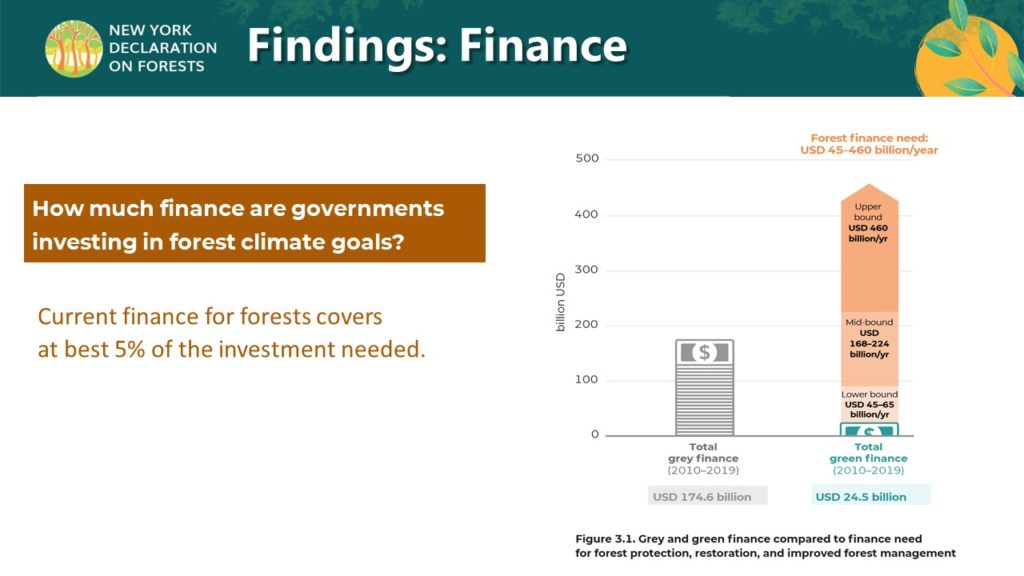
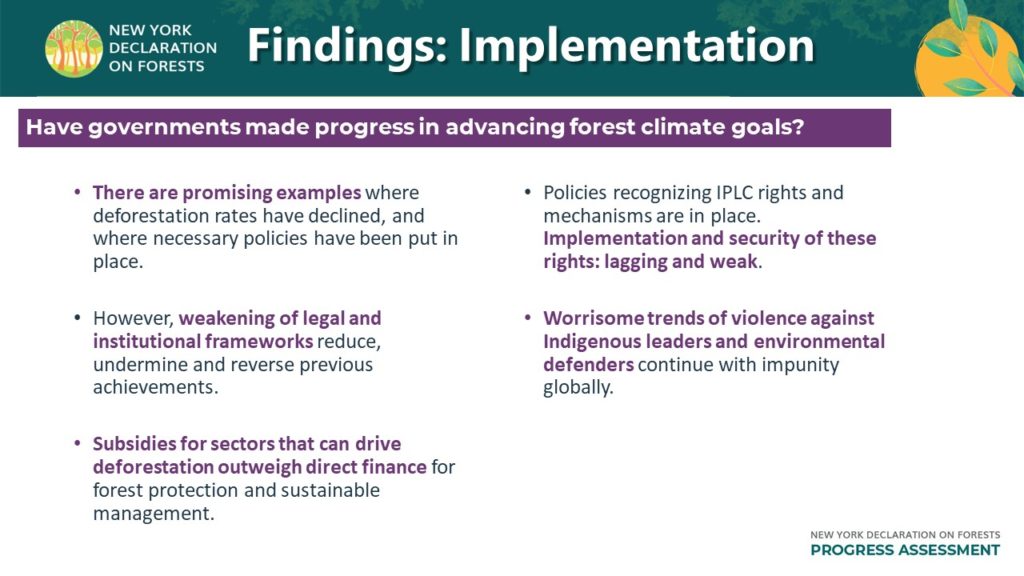
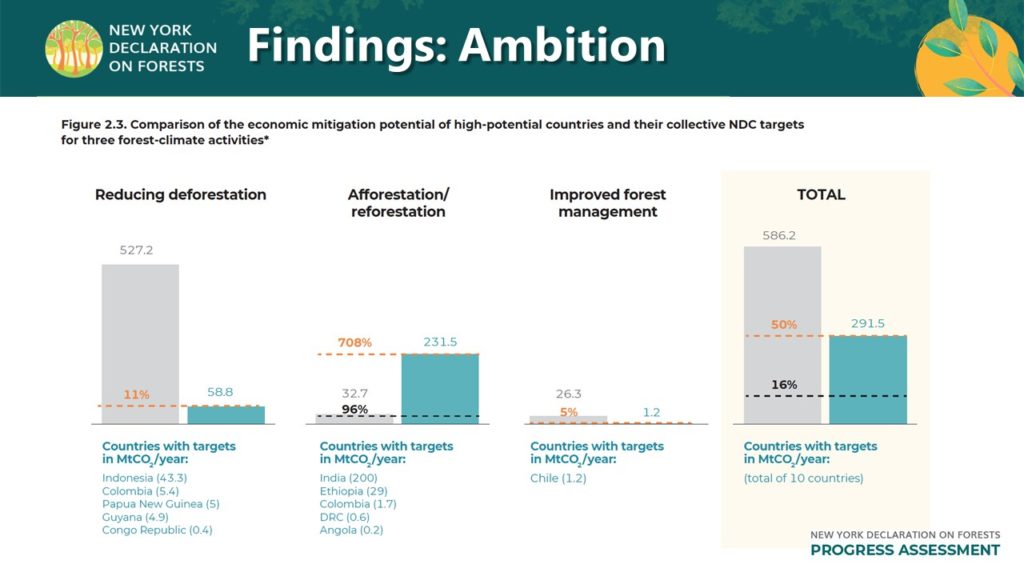
Next, the audience heard perspectives from governments and the private sector on their efforts to meet the NYDF goals so far and the progress they have made. These included:
These statements, and the many commitments presented in the first week of COP26, were accompanied with strong appeals from Indigenous Peoples, youth, and civil society to ensure accountability, access, and action on these commitments. Grace Balawag, Indigenous leader representing Tebtebba, stressed that Indigenous Peoples and Local Communities must be given a seat at the table in decision-making processes, funding for forests flow directly to communities, and a human-rights based approach be upheld to achieve global forest goals. Building on these requests, Oluwaseum Adekugbe from Youth4Nature called for enhanced accountability and monitoring of global and national forest commitments, the inclusion of youth in decision-making processes, and direct financial flows to youth who are at the frontlines of tackling the climate and biodiversity crises. Finally, Susan Lieberman at WCS forewarned of the need to ensure the preservation of intact forests and tackling the issue of nature crime, stating that the interlinkage between weak governance and regulation and environmental destruction cannot be ignored and urging that coordinated and holistic solutions be utilized to protect forests for climate, biodiversity, and people.
The event closed with remarks from Norbert Gorissen from Germany’s Federal Ministry of Environment, Nature Conservation and Nuclear Safety who emphasized five key actions in the next decade: (1) including forest protection in climate goals, (2) making sustainable consumption a reality, (3) removing deforestation-related activities from investment portfolios, (4) increasing private and public finance, and (5) improving accountability systems to meet the NYDF goals. In addition, he affirmed the importance of implementing Indigenous Peoples' rights and stressed the key role the NYDF Platform and Progress Assessment can play in increasing accountability and promoting collaboration.
Amidst the growing number of pledges and ambition on forests, this NYDF event elaborated on the need to shift from commitments to collective and bold action to protect, restore, and sustainably managing forests for people and the climate.
Related links and resources: